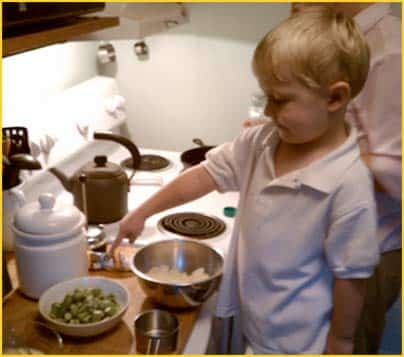
Childhood Obesity News has been considering the different reasons why parents would do well to center their activities in the kitchen and include their children as much as possible. Katherine Workman, for instance, brings up the matter of “investment.” If a child has a chance to work in a garden or even visit a farm, an emotional connection can begin to form, which might foster a whole different relationship with food.
To grow something, you don’t even need dirt. With a glass jar, a piece of screen, and a rubber band, you’re got a sprout garden. What could be more awesomely healthful than fresh sprouts? If a child grows them himself, there’s a good chance he might even eat them. You just never know where an experiment might lead. Sprout fun can carry on for weeks, because many different kinds of seeds will produce edible sprouts. The parent-child activity could be researching healthful dips or dressings for sprouts, and trying them out.
And then, there’s stir-fry. Sure, sprouts can be stir-fried all by themselves, but what if a child could be convinced to try out one or two other vegetables to go with them? Why are the different veggies traditionally sliced in different, very specific ways? There is a reason for everything, and it’s something to talk about and explore. Ask the kid to look up what’s the best kind of oil for stir-fry, from the health angle. If she doesn’t know how to look up something like that, show her.
Sometimes, the tiniest childhood incident can have significant later effects. Even if a harried parent can never manage to move beyond promoting sprouts, unimaginable results could turn up later, like a determination to go for a degree in biology. You never know.
“An ounce of prevention is worth a pound of cure.” Sometimes, nothing can beat on old saying. “A kilobyte of prevention is worth a gigabyte of cure” just doesn’t have the same ring to it. Another piece of ancient wisdom states, “As the twig is bent, so grows the tree.” How does this apply to childhood obesity? It’s a well-known fact that people continue to eat the things they first learned to identify as food, especially if it’s serving in the role of comfort food. An email correspondent writes:
When we kids were sick, my mother would give us a bowl of broken-up saltine crackers with milk poured over, and sprinkled on top with sugar. Apparently, the recipe dated back to the Great Depression. It didn’t have any special curative value, but in a time when most families were dirt-poor, that’s what passed for ‘invalid food’. Think about it — back then, a fresh orange was so rare, you’d get one in the toe of your Christmas stocking. The thing is, even when my mother was middle-aged, if she was upset, she would make herself a dish of busted-up crackers with milk and sugar.
The terrible thing about comfort food is, in many cases, its empty promise. The stuff we ingest in the hopes of alleviating emotional hurt can actually make us feel worse. The ingredients in typical junk food can actually cause depression and mood swings, the very problems we try to escape by indulging in comfort eating. An interesting piece by Le Cordon Bleu College of Culinary Arts explains why:
Foods loaded with fat, calories and carbohydrates typically have little nutritional benefit. While the first few bites are packed with pleasure, it’s the aftermath that leaves a sad and empty feeling. When consuming foods filled with sugars, the highs may make you feel good for the moment, but once they wear off, the crash leaves you wanting to repeat the nasty cycle… When you choose foods rich in Omega 3, folic acid, vitamin B12 or selenium, a remarkable increase in energy can cause a more positive transformation than the junk food you may crave.
This article also explains the reasons for the new comfort foods it recommends substituting for the old, such as nuts, broccoli, blueberries, and bananas. Bananas contain the feel-good chemical serotonin, and they taste even sweeter when served warm.
So, bend that twig — with a banana!
Your responses and feedback are welcome!
Source: “Get your kids into the kitchen and feed them for life,” Eatocracy, CNN.com, 02/17/12
Source: “Choose happy foods, not foods that make you sad,” OsceolaIowa.com, 5/26/10
Image by NataPics, used under its Creative Commons license.

 FAQs and Media Requests:
FAQs and Media Requests: 











